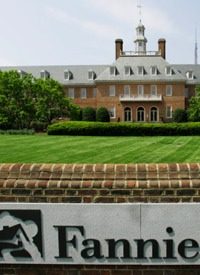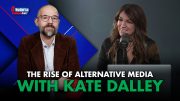
When ABC News announced that Fannie Mae and Freddie Mac would be de-listed by the New York Stock Exchange on July 8, writer Rich Blake said that “these once mighty enterprises will trade alongside stocks on the Over-The-Counter Bulletin Board, a place where many companies go to die.”
As a eulogy Blake expressed the usual statist paean: “It’s difficult to contemplate how the U.S. mortgage market could function without the nearly $6 trillion in funding they provide to this market and the institutions that comprise it…. The housing sector would be in even worse shape if not for those twin … enterprises.”
The fact that these government-sponsored enterprises were predicted to fail by free-market economists such as David C. John, Arnold Kling, Sheldon Richman, and many others, entirely escaped his attention. He did raise an interesting question, however: What happens next?
Critics of the financial reform bill have noted that nothing in that legislation addresses either institution, concluding that they are “too big to fail, and too broke to fix.” Others are suggesting that now is not the time to promote any type of “fix” for the government mortgage giants. Paul Leonard, a spokesman for the Housing Policy Council, said, “It’s a problem that can’t be ignored much longer, but at the same time, with the economy still not fully recovered and the housing market still wobbly, now is definitely not the time to pull the plug.” His group has advocated replacing Fannie and Freddie with a “new private-sector enterprise that would be known as [a] Mortgage Securities Insurance Compan[y]” that would not be backed by the government “explicitly,” but whose securities would still have an implicit government guarantee. “Without such a guarantee, investors in [mortgage-backed-securities] will seek other investments, and as they do so, the level of funds available for housing finance will be reduced and the cost of mortgage loans will increase.”
On the other hand, Ken Duffy of Bearing Asset Management in Dallas said that both institutions “are hemorrhaging right now and [only] the taxpayer is keeping them on life support. You have a sliver of equity on a mountain of debt. They need to be put down. Sever all ties to the government and let the private sector run the mortgage market.”
How exactly would that work? The key, according to David John, is understanding that although Fannie Mae and Freddie Mac appear to be owned by private stockholders, “they are really artificial government creations that are very different from private sector companies…. They are government-sponsored dominators of a market rather than as participants in it.” They purchase mortgages from lenders, package those mortgages into securities that look like bonds called mortgage-backed securities, and sell them to investors, public and private, around the world. John says, “Congress needs to break up both Fannie Mae and Freddie Mac and allow them to be replaced with a much larger number of genuine private sector companies. The new, smaller companies would perform the same functions” but without removing the moral hazard of the implicit or explicit government guarantee against failure. In fact, John said, “Congress should … make it explicitly clear that there is no federal government backing for their securities.” By allowing the market to determine risks assumed by the private entities, poor quality mortgages would be properly graded so that investors would know the risks, and would charge appropriately to take them on.
Arnold Kling of the Cato Institute called “the Fannie Mae-Freddie Mac crisis … the most avoidable financial crisis in history.” He recommends privatization as well, with regulators ‘freezing the mortgage purchase activities of the [two] GSEs while at the same time loosening the capital requirements for banks to hold low risk mortgages. The result would almost surely be an industry much less concentrated than the current duopoly.” That new private mortgage industry “would face the discipline of the capital markets, which would [force them to] bear the default risk and investment risk of [those] mortgages.” He added that “there is no fool-proof system for handling mortgage credit risk,” but that such risk would be borne by participants in the private market instead of the taxpayer.
Sheldon Richman, writing for The Freeman, stated that Fannie Mae and Freddie Mac “were created — intentionally — to distort the housing and mortgage markets. That is, government planners were not content to let voluntary exchange and spontaneous market forces configure those industries unmolested…. They were designed to channel money to mortgage lenders so that they would loan widely, especially to people who might have been priced out of a fully private mortgage market. Th[at] system inevitably lowered lending standards.”
However, he explains, “In a free society supply and demand would govern markets. The demand for houses would be determined by people’s preferences and the wealth and income at their disposal. Supply would be determined by…profit expectations…and the demand for housing.”
Arguments that favor the free market are persuasive, at least in the abstract. While these writers are touching on how a free market can work better in place of the failed “duopoly,” much more work needs to be done before the free market is allowed to function properly once again. Until that happens, Fannie and Freddie, even though their shares are trading well below a dollar in the OTC market, will continue to suck up taxpayer dollars and distort the market in a continuing political effort to “restart” the economy.
Photo: AP Images



